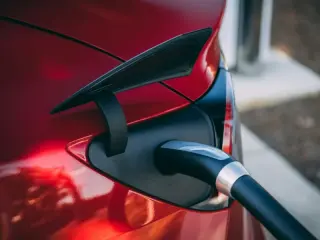
In the rapidly evolving landscape of electric vehicles (EVs), one question always comes to mind: how long do EV batteries last?
Batteries are a critical component of an electric vehicle as they directly influence the vehicle's overall lifespan, cost-effectiveness, and environmental impact. This guide delves into the factors that affect EV battery lifespan, examines technological advances, and provides top tips for EV battery maintenance.
If you’re considering making the switch to an electric fleet, understanding the durability and performance of EV batteries is crucial. This will allow you to maximise the longevity of your vehicles, saving your business in the long run.
Average lifespan of EV batteries
As with any electrical device, the capabilities of an electric car battery do deteriorate over time. However, there are ways to limit this degradation, so it shouldn’t deter your business from choosing electric vehicles.
The average lifespan of electric vehicle batteries ranges between 8 and 15 years, depending on the care and maintenance it receives. Typically, EV batteries are designed to retain at least 70% of their capacity even after 8 years or 100,000 miles. This is similar to the average lifespan of a conventional internal combustion engine (ICE), which is around 10 years.
Advances in both EV and ICE technologies are constantly improving their durability and longevity, but EVs offer the added benefit of fewer moving parts, reducing their maintenance needs.
Factors influencing battery longevity
Although the capacity of EV batteries will inevitably decline over time, there are several external factors which can influence battery longevity.
Usage patterns
Usage patterns and charging habits are the key contributors to battery degradation. Aggressive driving with frequent rapid acceleration and harsh braking can lead to higher battery stress, limiting its longevity. By adapting your driving style and ensuring your vehicle is not overloaded, you can ensure that your EV batteries last longer.
Your EV charging habits will also have a significant impact on the lifespan of your battery. Although fast chargers are extremely convenient, they put additional strain on EV batteries as they generate a high amount of power in a short amount of time. As this accelerates battery wear, you should aim to use slow, home chargers whenever possible.
Regularly charging your EV to 100% and discharging the battery to very low levels can reduce its lifespan. Instead, you should keep your EV within the optimal State of Charge (SoC), which is between 20% and 80%, as this will help to extend battery life.
Environmental conditions
Extreme temperatures can not only affect the driving range of an EV but also the longevity of the battery. Both hot and cold climates can negatively affect battery health and performance. To mitigate the impact, it’s recommended that you:
Park in shaded areas
Precondition your EV
Charge during off-peak hours when temperatures are cooler.
In addition, high humidity levels can reduce charging efficiency and lead to increased maintenance costs. The excess moisture can corrode battery terminals and connectors, causing electrical faults and safety hazards. Effective sealing and robust thermal management systems are crucial to protect your EV from high humidity, ensuring longer electric car battery life.
Battery technology
There are several different types of batteries used in modern electric vehicles, and they each have varying lifespans.
Lithium-ion batteries - these are the most common type of battery used in EVs due to their lower costs. They are better equipped for high-performance driving and quick charging.
Nickel-metal hydride batteries - often used in hybrid vehicles, these batteries have long life cycles. However, they are more expensive and can discharge themselves at high temperatures.
How large is an electric battery?
The size of an electric car battery can vary significantly depending on the type of vehicle and how it’s designed to be used. Most electric car batteries are measured in kilowatt-hours (kWh), which indicates how much energy they can store and, ultimately, how far the vehicle can travel on a single charge.
Battery size and capacity
Smaller electric cars typically have batteries ranging from 30–45kWh, which is well-suited to urban driving and shorter daily journeys. Mid-range family EVs often sit between 50–75kWh, offering a balance between range and affordability. Larger vehicles, such as SUVs and long-range models, can have batteries of 90kWh or more, designed to support longer motorway journeys and higher energy demands.
Battery type
Most modern electric cars use lithium-ion batteries, similar in principle to those found in smartphones and laptops, but built on a much larger scale. These batteries are favoured because they offer a good balance of energy density, durability, and charging efficiency. As technology develops, newer battery chemistries are also being explored to improve range, lifespan, and sustainability.
Battery weight and physical size
Electric car batteries are heavy. Depending on capacity, an EV battery can weigh anywhere from 250kg to over 600kg. They are usually mounted low in the vehicle floor, which helps lower the centre of gravity and improve handling. While the battery takes up a significant amount of space, EVs are designed around this layout, meaning interior and boot space are often comparable to petrol or diesel equivalents.
Understanding the size and weight of an electric car battery can help drivers and businesses make more informed decisions when choosing an EV, particularly when considering range, payload, and overall vehicle efficiency.
Signs of battery degradation
Detecting signs of EV battery degradation is crucial for maintaining vehicle performance and ensuring long-term reliability. EV drivers should look out for these signs:
Reduced driving range – as the battery degrades, the driving range of your EV may decrease.
Longer charging times – if your EV takes significantly longer to recharge than when the vehicle was new, it may be a sign of degradation.
Reduced performance – slower acceleration and reduced power output, particularly when travelling with heavy loads, suggests the battery is not delivering power efficiently.
Error messages or alerts – most electric vehicles have advanced technological features which provide insight into battery health. Dashboard warnings or error messages can be a direct indicator of battery degradation, so they should never be ignored.
EV battery maintenance
Most manufacturers offer a warranty of around 8 years, or 100,000 miles for an EV battery, giving you peace of mind when purchasing an electric vehicle.
Regular maintenance is the best way to ensure your EV battery lasts. It’s also important to understand how to charge your electric vehicle efficiently, as your habits will have a direct impact on battery health.
Costs for replacement EV batteries
If you do need to replace your EV battery, then you should be prepared for an expensive bill. Due to high material prices, the current cost for a replacement EV battery is around £118 per kilowatt-hour. This works out at over £9000 for a vehicle such as the Kia EV6!
However, this shouldn’t put you off switching to electric, as the likelihood of you needing a replacement battery is low if you properly care for your vehicle.
Electric vehicle battery recycling
Another environmental benefit of electric vehicles is that their batteries can be recycled. Once they lose their capacity within an electric vehicle, they can be repurposed as electric storage devices.
Currently, less than 5% of lithium batteries are recycled globally. This is partly due to EVs being a relatively new concept, so drivers have not needed to replace their batteries yet. As we see more electric vehicles on the road, the number of EV batteries that are recycled will likely grow.
Electric vs manual car batteries: what’s the difference?
Although they share the word battery, electric car batteries and traditional manual (petrol or diesel) car batteries serve very different purposes and operate on a completely different scale.
Electric car batteries
Electric vehicles use a high-voltage traction battery to power the motor and drive the vehicle. This battery stores a large amount of energy, measured in kilowatt-hours (kWh), and is responsible for everything from acceleration to overall driving range. Electric car batteries are designed to last for many years, with most manufacturers offering warranties of around 8 years or 100,000 miles. They are recharged via home chargers, public charge points, or increasingly advanced on-street and workplace charging solutions.
Manual car batteries
Manual (and automatic) petrol and diesel cars use a 12-volt starter battery. This battery does not drive the vehicle but is used to start the engine and power electrical systems such as lights, infotainment, and dashboard controls. Once the engine is running, the alternator takes over, recharging the battery as you drive. These batteries are much smaller, lighter, and typically need replacing every 3–5 years.
Why the difference matters
Understanding the difference between electric and manual car batteries is important when comparing running costs, maintenance, and long-term ownership. Electric car batteries are more expensive to produce but require far less ongoing maintenance and eliminate fuel costs altogether. In contrast, manual car batteries are cheaper upfront but are just one part of a vehicle that relies on fuel, oil, and more frequent servicing.
For businesses managing fleets, these differences also affect vehicle downtime, maintenance planning, and total cost of ownership. Knowing how each battery type works helps drivers and operators make more informed decisions when choosing between electric and traditional vehicles.
Future trends and innovations
EV technology is constantly advancing and is widely considered to be the fuel of the future. The emergence of solid-state batteries will innovate the industry, offering faster charging times, increased driving ranges and improved safety in comparison to lithium-ion batteries.
Additionally, recycling of EV batteries is becoming increasingly important, aiming to reduce environmental impact and resource dependency. Improvements in battery management systems (BMS) and integration with renewable energy sources, such as wind and solar, are also key areas of innovation. This will enhance efficiency and grid stability.
EV batteries have been proven to match the lifespan of ICE vehicles, so battery deterioration should only be a concern if you plan on using the same vehicle for many years. As EV technology continues to evolve, we’ll see continuous improvements in battery life.
Plus, with the upcoming ban on new petrol and diesel vehicles, it’s the ideal time for businesses to start considering greener alternatives for their fleets.
To help ease the transition, we offer EV charge cards to businesses. These are designed to save you money and time, plus all transactions are conveniently displayed on one invoice. If you’re not ready to switch to electric, then you can compare our range of fuel cards.




